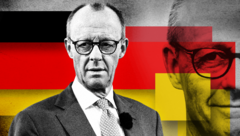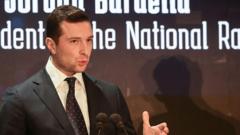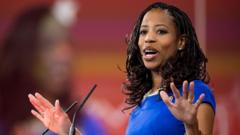Friedrich Merz, the Conservative front-runner for Germany’s chancellorship, stands at a crossroads of political risk-taking and deep-rooted traditionalism, as he navigates a tumultuous electoral landscape marked by his controversial ties to far-right factions.
Friedrich Merz: Germany's Divisive Conservative Leader With Ambitious Goals

Friedrich Merz: Germany's Divisive Conservative Leader With Ambitious Goals
Merz emerges as a controversial contender for German leadership amid political turmoil and shifting voter sentiments.
New article text:
Friedrich Merz, a prominent figure in Germany's political arena, is poised as a potential next leader amidst a political crisis that has gripped the country. Supporters portray him as a necessary figure to address Europe’s ongoing challenges. However, critics argue that his strategies resonate more with alarm than with progress.
Merz, a long-standing member of the Christian Democratic Union (CDU), has set himself apart by attempting to shift the party’s centrist posture, a move arguably driven by desperation in the wake of Chancellor Olaf Scholz’s government collapse last year. His recent attempts to tighten immigration laws, reportedly with the backing of far-right parliament members, illustrate Merz's willingness to court controversy, even at the risk of alienating moderate voters and drawing ire from his predecessors.
At 69, Friedrich Merz has embarked on an ambitious trajectory, given his years in the shadows due to Angela Merkel’s dominance in CDU politics. Once, he seemed relegated to corporate life, only to make a comeback amid shifting party dynamics.
Despite the muted reception of his recent speeches in high-profile venues, Merz aims to renew his image and affirm his political viability. Born into a conservative upbringing, his trajectory has had its share of ups and downs - from early aspirations in law and politics to a disillusioned exit in 2009. His return to power now rests on his ability to redefine conservatism for a new era, while also potentially alienating key factions of the electorate.
His risky bid for immigration reform, which leveraged far-right support, has sparked widespread protests and controversy. Merz insists there was no formal collaboration with the Alternative für Deutschland (AfD), the far-right party, though critics argue he has unwittingly bolstered their platform. This paradox underpins the skepticism surrounding his leadership style, raising questions about his ability to unify diverse voter bases ahead of elections.
As public sentiment shifts and the electoral clock ticks down, Friedrich Merz’s future remains uncertain. His ambition to reframe the CDU's image will be severely tested, as potential coalition partners weigh the implications of his bold strategies and alliances. With the stakes rising, both observers at home and EU diplomats internationally are watching closely, eager for a resolution to Germany's political gridlock.
Friedrich Merz, a prominent figure in Germany's political arena, is poised as a potential next leader amidst a political crisis that has gripped the country. Supporters portray him as a necessary figure to address Europe’s ongoing challenges. However, critics argue that his strategies resonate more with alarm than with progress.
Merz, a long-standing member of the Christian Democratic Union (CDU), has set himself apart by attempting to shift the party’s centrist posture, a move arguably driven by desperation in the wake of Chancellor Olaf Scholz’s government collapse last year. His recent attempts to tighten immigration laws, reportedly with the backing of far-right parliament members, illustrate Merz's willingness to court controversy, even at the risk of alienating moderate voters and drawing ire from his predecessors.
At 69, Friedrich Merz has embarked on an ambitious trajectory, given his years in the shadows due to Angela Merkel’s dominance in CDU politics. Once, he seemed relegated to corporate life, only to make a comeback amid shifting party dynamics.
Despite the muted reception of his recent speeches in high-profile venues, Merz aims to renew his image and affirm his political viability. Born into a conservative upbringing, his trajectory has had its share of ups and downs - from early aspirations in law and politics to a disillusioned exit in 2009. His return to power now rests on his ability to redefine conservatism for a new era, while also potentially alienating key factions of the electorate.
His risky bid for immigration reform, which leveraged far-right support, has sparked widespread protests and controversy. Merz insists there was no formal collaboration with the Alternative für Deutschland (AfD), the far-right party, though critics argue he has unwittingly bolstered their platform. This paradox underpins the skepticism surrounding his leadership style, raising questions about his ability to unify diverse voter bases ahead of elections.
As public sentiment shifts and the electoral clock ticks down, Friedrich Merz’s future remains uncertain. His ambition to reframe the CDU's image will be severely tested, as potential coalition partners weigh the implications of his bold strategies and alliances. With the stakes rising, both observers at home and EU diplomats internationally are watching closely, eager for a resolution to Germany's political gridlock.






















